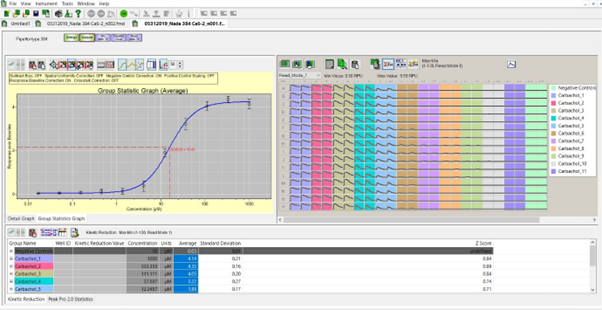Designed on the back of the success of supporting GPCR and membrane potential assays, Molecular Devices' industry-leading kinetic screening platform allows researchers to carry out real-time screening of human-derived induced pluripotent stem cells (hiPSCs) – differentiated into cardiomyocytes and neurons – to ensure fast toxicology and lead compound identification.
The FLIPR® Penta High-Throughput Cellular Screening System helps capture images up to 100 times per second and examines calcium oscillation patterns by utilizing over 30 several measurements.
It rapidly determines critical events like delayed beat recovery and irregular beating to disclose discerning information concerning how various compounds affect cells.
FLIPR Applications
The FLIPR Penta System assists an extensive range of assays, like GPCR assays utilizing FLIPR Calcium Assay Kits and Membrane Potential assays using the FLIPR Membrane Potential Assay Kit, FLIPR Calcium Assay Kit, and FLIPR Potassium Assay Kit.
Cardiomyocytes can also be utilized to assess compound effects early on in the drug discovery process with the EarlyTox Cardiotoxicity Kit.
Source: Molecular Devices UK Ltd
| . |
. |
| GPCR |
Monitor GPCR activity and corresponding intracellular second messenger changes (Calcium and cAMP) using fluorescence and luminescence cell-based assays |
| Membrane Potential |
Observe real-time membrane potential changes associated with ion channel activation and ion transporter proteins |
| Cardiomyocytes |
Observe calcium flux to assess cardiotoxicity in the early stages of drug discovery |
| Potassium channels |
Measure functional activity of ligand- and voltage-gated potassium channels |
| Ligand-gated Calcium Channels |
Measure the change of global intracellular calcium, in response to the activation of ion channels |
| 3D assays |
Detect calcium oscillations in 3D cultures, providing a biologically relevant assay system to assess potential new pharmaceutical treatments and environmental toxins |
| Biochemical assay |
Enable fast “inject and read” kinetic enzyme assays, increasing the throughput of biochemical assays compared to standard plate readers |
Fast, Effective High-Throughput Cellular Screening
Users can install user-exchangeable 96-, 384-, and 1536-well pipettors in just a matter of minutes without needing any tools. Pipetting precision and accuracy are assured with automatic pipettor alignment and identification.
Concurrent liquid transfer to around 2,000 cells per well in a 1536-well plate is obtained with the help of a proprietary, contact-based elastomeric technology. The Advanced Workflow Engineering Solutions team is on hand to help optimize speed.

Image Credit: Molecular Devices UK Ltd
Intuitive, User-Friendly Software Interface
The FLIPR Penta system uses the ScreenWorks software to characterize and run experimental protocols.

Image Credit: Molecular Devices UK Ltd
By making use of a drag-and-drop interface, protocols can be easily set up to include the following:
- Single or ratiometric kinetic cell-based reading
- Cell suspension delivery with automatable cleaning protocols
- Fluorescent or luminescent read modes
- Simultaneous transfer of 96, 384, or 1536 liquid or cells in suspension
- Multiple aspirations, complex quadrant, or multiple dispensing liquid handling
- Tip washing with up to two solvents
- Optional aequorin luminescence detection or standard fluorescence
- Simple-to-create automation protocols
The FLIPR Penta system is just one example of a ground-breaking, high-performance product that considerably improves research productivity and effectiveness.